- Home
- Lois Lowry
Messenger (The Giver Trilogy) Page 2
Messenger (The Giver Trilogy) Read online
Page 2
“Ramon?”
“Yes. I think I hear Ramon’s voice. He’s hoarse.”
“Yes, he has a cough. He’s taking herbs for it.”
Now, recalling it, Matty asked his friend, “Did you keen? I think we may have heard you.”
“Yes. They had enough. But since I was there, they let me join. I have this cough, though, so my voice wasn’t very good. I only went because I wanted to see the body. I’ve never seen one.”
“Of course you have. You were with me when we watched them lay out Stocktender for burial. And you saw that little girl after she fell in the river and they pulled her out drowned. I remember you were there.”
“I meant entangled,” Ramon explained. “I’ve seen plenty of dead. But till last night I never saw one entangled.”
Neither had Matty. He had only heard of it. Entangling happened so rarely that he had begun to think of it as a myth, something from the past. “What was it like? They say it’s hideous.”
Ramon nodded. “It was. It looked as if first the vines grabbed him by the neck and pulled tight. Poor Gatherer. He had grabbed at them to pull loose but then they curled around his hands as well. He was completely entangled. The look on his face was fearsome. His eyes were open but twigs and all had started to enter under the lids. And they were in his mouth, too. I could see something wrapped around his tongue.”
Matty shuddered. “He was such a nice man,” he said. “He always tossed berries to us when he was out gathering. I would open my mouth wide and he would aim for it. If I caught a berry in my mouth he cheered and gave me extra.”
“Me too.” Ramon looked sad. “And his wife has a new baby. Someone said that’s why he went. He wanted to go tell her family about the baby.”
“But didn’t he know what would happen? Hadn’t he received Warnings?”
Ramon coughed suddenly. He bent over and gasped. Then he straightened up and shrugged. “His wife says not. He went once before, when their first child was born, and had no trouble. No Warning.”
Matty thought about it. Gatherer must have overlooked a Warning. The early ones were sometimes small. He felt great sadness for the gentle, happy man who had been so brutally entangled and had left two children fatherless. Forest always gave Warnings, Matty knew. He entered so often himself and always was watchful. If he had one Warning, even the smallest, he would never enter again. The blind man had entered only once, to return to his original village when it needed his wisdom. He had come back safely, but he had had a small Warning on his return: a sudden painful puncture from what had seemed a tiny twig. He couldn’t see it, of course, though later he said he had felt it come forward, had perceived it with the kind of knowledge that had made the people designate Seer as his true name. But Matty, still a young boy, had been with him then, as a guide; and Matty had seen the twig grow, expand, sharpen, aim itself, and stab. There was no question. It was a Warning. The blind man could never enter Forest again. His time for going back had ended.
Yet Matty had never been warned. Again and again he entered Forest, moved along its trails, spoke to its creatures. He understood that for some reason, he was special to Forest. He had traveled its paths for years, six years now, since that first time, when he was still very young and had left the home that had been cruel to him.
“I’m never going in,” Ramon said firmly. “Not after seeing what it did to Gatherer.”
“You don’t have a place to go back to,” Matty pointed out. “You were born in Village. It’s only those who try to go back to someplace that they left once.”
“Like you, maybe.”
“Like me, except I’m careful.”
“I’m not taking the chance. Is this a good place to fish?” Ramon asked, changing the subject. “I don’t want to walk any farther. I’m tired all the time lately.” They had been ambling toward the river, skirting the cornfield, and had reached the grassy bank where they often fished together. “We caught a lot here last time. My mother cooked some for dinner, but there were so many that I nibbled on leftovers while I was playing the Gaming Machine after dinner.”
The Gaming Machine again. Ramon mentioned it so often. Maybe Gloater would be his true name, Matty thought. He had already decided on Boaster, but now, in his mind, he decided Gloater was more appropriate. Or Bragger. He was tired of hearing about the Gaming Machine. And a little jealous, too.
“Yes, here,” Matty said. He scrambled down the slippery bank to the place where a boulder, large enough to stand on, jutted out. Both boys climbed the huge outcropping of rock and settled at the top to prepare their fishing gear and cast their lines for salmon.
Behind them, Village, quiet and peaceful, continued its daily life. Gatherer had been buried this morning. With her toddler playing on the floor by her feet, his widow now nursed her new baby on the porch of her homeplace, attended by comforting women who sat with their knitting and embroidery and spoke only of happy things.
In the schoolhouse, Mentor, the schoolteacher, gently tutored a mischievous eight-year-old named Gabe, who had neglected his studies to play and now needed help. His daughter, Jean, sold flower bouquets and loaves of fresh-baked bread in her marketplace stall while she flirted, laughing, with the gangly, self-conscious boys who stopped by.
The blind man, Seer, made his way through the lanes of Village, checking on the populace, assessing the well-being of each individual. He knew each fence post, each crossroad, each voice and smell and shadow. If anything was amiss, he would do his best to make it right.
From a window, the tall young man known as Leader looked down and watched the slow and cheerful pace of Village, of the people he loved, who had chosen him to rule and guard them. He had come here as a boy, finding his way with great difficulty. The Museum held the remains of a broken sled in a glass case, and the inscription explained that it had been Leader’s arrival vehicle. There were many relics of arrival in the Museum, because each person who had not been born in Village had his own story of coming there. The blind man’s history was told there, too: how he had been carried, near dead, from the place where enemies had left him with his eyes torn out and his future in his own place gone.
In the Museum’s glass cases there were shoes and canes and bicycles and a wheeled chair. But somehow the small red-painted sled had become a symbol of courage and hope. Leader was young but he represented those things. He had never tried to go back, never wanted to. This was his home now, these his people. As he did every afternoon, he stood at the window and watched. His eyes were a pale, piercing blue.
He watched with gratitude as the blind man moved through the lanes.
He could see beyond a porch railing to the young woman who rocked an infant and mourned her husband. Grieve gently, he thought.
He could see beyond the cornfield to where two young boys named Matty and Ramon were dangling lines into the river. Good fishing, he thought.
He could see beyond the marketplace to the cemetery where Gatherer’s ruined body had been buried. Rest in peace, he thought.
Finally he looked toward the border of Village, to the place where the path entered Forest and became shrouded in shadows. Leader could see beyond the shadows but was not certain what he saw. It was blurred, but there was something in Forest that disturbed Leader’s consciousness and made him uneasy. He could not tell whether it was good or bad. Not yet.
***
Deep in the thick undergrowth near the clearing, at the edge of Leader’s puzzled awareness, a small green frog ate an insect it had caught with its sticky, fastdarting tongue. Squatting, it moved its protruding eyes around, trying to sense more insects to devour. Finding nothing, it hopped away. One back leg was oddly stiff but the frog barely noticed.
3
“If we had a Gaming Machine,” Matty commented in a studied, offhand manner, “our evenings would never be boring.”
“You think our evenings are boring, Matty? I thought you enjoyed our reading together.”
Seer laughed, and corrected himself.
“Sorry. I meant your reading to me, Matty, and my listening. It’s my favorite time of day.”
Matty shrugged. “No, I like reading to you, Seer. But I meant it’s not exciting.”
“Well, we should choose a different book, perhaps. That last one—I’ve forgotten its name, Matty—was a little slow-going. Moby Dick. That was the one.”
“It was okay,” Matty conceded. “But it was too long.”
“Well, ask at the library for something that would move along more quickly.”
“Did I explain to you how a Gaming Machine works, Seer? It moves very quickly.”
The blind man chuckled. He had heard it all before, many times. “Run out to the garden and get a head of lettuce, Matty, while I finish cleaning the fish. Then you can make a salad while the fish cooks.”
“And also,” Matty continued in a loud voice as he headed for the garden just beyond the door, “it would be a nice end to a meal. Something sweet. Sort of a dessert. I did tell you, didn’t I, how the Gaming Machine gives you a candy when you win?”
“See if there’s a nice ripe tomato while you’re out there getting the lettuce. A sweet one,” Seer suggested in an amused voice.
“You might get a peppermint,” Matty went on, “or a gumdrop, or maybe something they call a sourball.” Beside the back step he reached into the vegetable garden and uprooted a small head of lettuce. As an afterthought, he pinched a cucumber loose from its vine nearby, and pulled some leaves from a clump of basil. Back in the kitchen, he put the salad things in the sink and halfheartedly began to wash them.
“Sourballs come in different colors, and each color is a flavor,” he announced, “but I suppose that wouldn’t interest you.”
Matty sighed. He looked around. Even though he knew the blind man wouldn’t see his gesture, he pointed to the nearby wall, which was decorated by a colorful wall-hanging, a gift from the blind man’s talented daughter. Matty stood often before it, looking carefully at the intricate embroidered tapestry depicting a large thick forest separating two small villages far from each other. It was the geography of his own life, and that of the blind man, for they had both moved from that place to this other, with great difficulty.
“The Gaming Machine could stand right there,” he decided. “It would be very convenient. Extremely convenient,” he added, aware that the blind man liked it when he exercised his vocabulary.
Seer went to the sink, moved the washed lettuce to the side, and began to rinse the cleaned salmon steaks. “And so we would give up—or maybe even trade away—reading, and music, in exchange for the extreme excitement of pulling a handle and watching sourballs spit forth from a mechanical device?” he asked.
Put that way, Matty thought, the Gaming Machine didn’t actually seem such a good trade. “Well,” he said, “it’s fun.”
“Fun,” the blind man repeated. “Is the stove ready? And the pan?”
Matty looked at the stove. “In a minute,” he said. He stirred the burning wood a bit so that the fire flared. Then he placed the oiled pan on top. “I’ll do the fish,” he said, “if you fix the salad.
“I brought some basil in, too,” he added, with a grin, “just because you’re such a salad perfectionist. It’s right there beside the lettuce.” He watched while the blind man’s deft hands found the basil and tore the leaves into the wooden bowl.
Then Matty took the fish and laid it in the pan, swirling the oil around. In a moment the aroma of the sautéing salmon filled the room.
Outside, it was twilight. Matty adjusted the wick on an oil lamp and lighted it. “You know,” he remarked, “when you win a candy, a bell rings and colored lights blink. Of course that wouldn’t matter to you,” he added, “but some of us would really appreciate—”
“Matty, Matty, Matty,” the blind man said. “Keep an eye on that fish. It cooks quickly. No bell rings when it’s done.
“And don’t forget,” he added, “that they traded for that Gaming Machine. It probably came at a high cost.”
Matty frowned. “Sometimes you get licorice,” he said as a last attempt.
“Do you know what they traded? Has Ramon told you?”
“No. Nobody ever tells.”
“Maybe he doesn’t even know. Maybe his parents didn’t tell him. That’s probably good.”
Matty took the pan from the stove and slid the browned fish onto two plates, one after the other. He placed them on the table and brought the salad bowl from the sink. “It’s ready,” he said.
The blind man went to the bread container and found two thick pieces of bread that smelled fresh-baked. “I got this at the marketplace this morning,” he said, “from Mentor’s daughter. She’ll make someone a good wife. Is she as pretty as her voice makes her sound?”
But Matty was not going to be diverted by reminders of the schoolteacher’s pretty daughter. “When’s the next Trade Mart?” he asked, when they were both seated.
“You’re too young.”
“I heard that there was one coming soon.”
“Pay no attention to what you hear. You’re too young.”
“I won’t be always. I ought to watch.”
The blind man shook his head. “It would be painful,” he said. “Eat your fish now, Matty, while it’s warm.”
Matty poked at the salmon with his fork. He could tell that there was to be no more discussion of trading. The blind man had never traded, not one single time, and was proud of it. But Matty thought that someday he himself would. Maybe not for a Gaming Machine. But there were other things that Matty wanted. He ought to be allowed to know how the trading worked.
He decided he would find out. But first he had the other thing to worry about, and the troubling awareness that he had not dared to tell the blind man of it.
***
There were no secrets in Village. It was one of the rules that Leader had proposed, and all of the people had voted in favor of it. Everyone who had come to Village from elsewhere, all of those who had not been born here, had come from places with secrets. Sometimes—not very often, for inevitably it caused sadness—people described their places of origin: places with cruel governments, harsh punishments, desperate poverty, or false comforts.
There were so many such places. Sometimes, hearing the stories, remembering his own childhood, Matty was astounded. At first, having found his way to Village, he had thought his own brutal beginnings—a fatherless hovel for a home; a grim, defeated mother who beat him and his brother bloody—were unusual. But now he knew that there were communities everywhere, sprinkled across the vast landscape of the known world, in which people suffered. Not always from beatings and hunger, the way he had. But from ignorance. From not knowing. From being kept from knowledge.
He believed in Leader, and in Leader’s insistence that all of Village’s citizens, even the children, read, learn, participate, and care for one another. So Matty studied and did his best.
But sometimes he slipped back into the habits of his earlier life, when he had been a sly and deceitful boy in order to survive.
“I can’t help it,” he had argued glumly to the blind man, in the beginning of their life together, when he had been caught in some small transgression. “It’s what I learnt.”
“Learned.” The correction was gentle.
“Learned,” Matty had repeated.
“Now you are relearning. You are learning honesty. I’m sorry to punish you, Matty, but Village is a population of honest and decent people, and I want you to be one of us.”
Matty had hung his head. “So you’ll beat me?”
“No, your punishment will be no lessons today. You will help me in the garden instead of going to school.”
It had seemed, to Matty then, a laughable punishment. Who wanted to go to school, anyway? Not him!
Yet, when he was deprived of it, and could hear the other children reciting and singing in the schoolhouse, he felt woefully lost. Gradually he had learned to change his behavior and to become one of Village’s happy childre
n, and soon a good student. Now half grown and soon to finish school, he slipped only occasionally into old bad habits and almost always caught himself when he did.
It bothered Matty greatly, now, having a secret.
4
Leader had summoned Matty for message-running.
Matty enjoyed going to Leader’s homeplace, because of the stairs—others had stairs, though Matty and the blind man did not, but Leader’s stairs were circular, which fascinated Matty, and he liked going up and down—and because of the books. Others had books, too. Matty had a few schoolbooks, and he often borrowed other books from the library so that he could read stories to the blind man in the evenings, a time they both enjoyed.
But Leader’s homeplace, where he lived alone, had more books than Matty had ever seen in one place. The entire ground floor, except for the kitchen to one side, was lined with shelves, and the shelves were filled with volumes of every sort. Leader allowed Matty to lift down and look at any one he wanted. There were stories, of course, not unlike the ones he found in the library. There were history books as well, like those he studied at school, the best ones filled with maps that showed how the world had changed over centuries. Some books had shiny pages that showed paintings of landscapes unlike anything Matty had ever seen, or of people costumed in odd ways, or of battles, and there were many quiet painted scenes of a woman holding a newborn child. Still others were written in languages from the past and from other places.
Leader laughed wryly when Matty had opened to a page and pointed to the unknown language. “It’s called Greek,” Leader said. “I can read a few words. But in the place of my childhood, we were not allowed to learn such things. So in my spare time, I have Mentor come and help me with languages. But…” Leader sighed. “I have so little spare time. Maybe when I’m old, I will sit here and study. I’d like that, I think.”
Matty had replaced the book and run his hand gently over the leather bindings of the ones beside it.

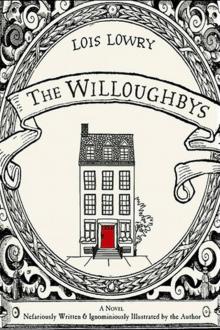 The Willoughbys
The Willoughbys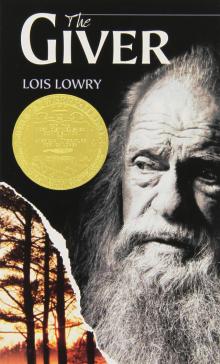 The Giver
The Giver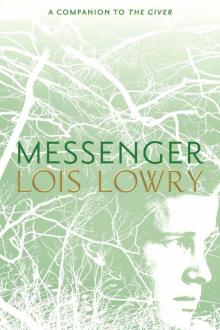 Messenger
Messenger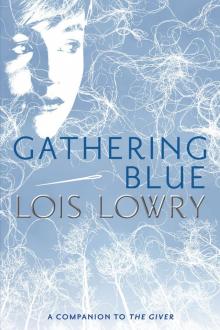 Gathering Blue
Gathering Blue Gooney Bird and All Her Charms
Gooney Bird and All Her Charms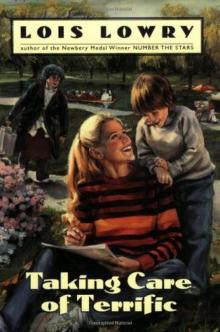 Taking Care of Terrific
Taking Care of Terrific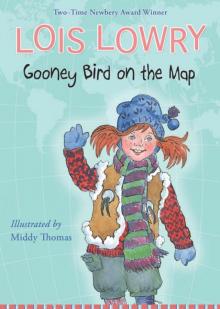 Gooney Bird on the Map
Gooney Bird on the Map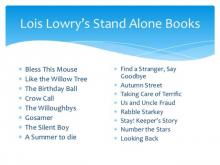 The Birthday Ball
The Birthday Ball Anastasia's Chosen Career
Anastasia's Chosen Career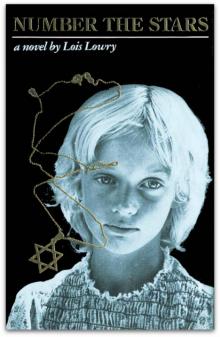 Number the Stars
Number the Stars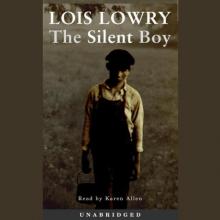 The Silent Boy
The Silent Boy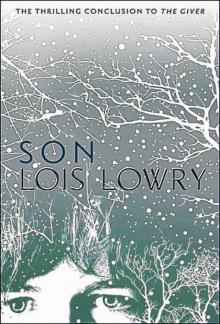 Son
Son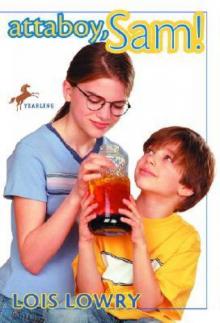 Attaboy, Sam!
Attaboy, Sam! Gooney Bird Greene
Gooney Bird Greene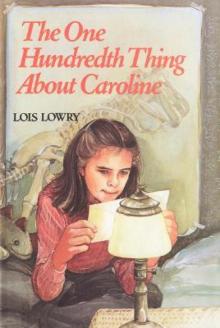 The One Hundredth Thing About Caroline
The One Hundredth Thing About Caroline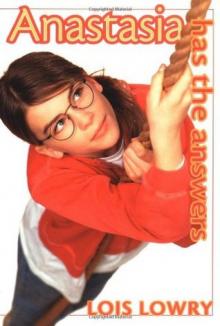 Anastasia Has the Answers
Anastasia Has the Answers Your Move, J. P.!
Your Move, J. P.! See You Around, Sam!
See You Around, Sam!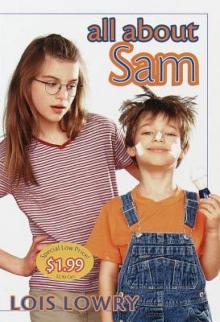 All About Sam
All About Sam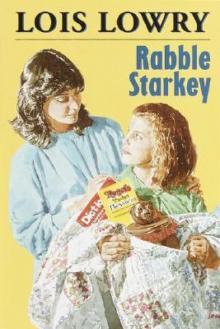 Rabble Starkey
Rabble Starkey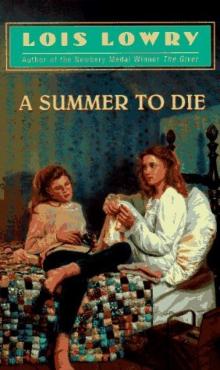 A Summer to Die
A Summer to Die Anastasia at This Address
Anastasia at This Address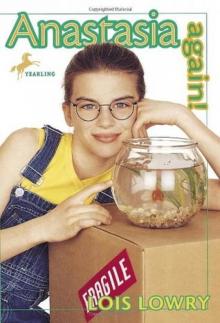 Anastasia Again!
Anastasia Again!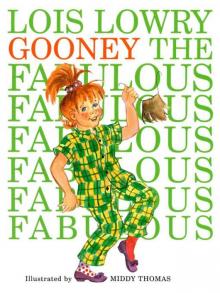 Gooney the Fabulous
Gooney the Fabulous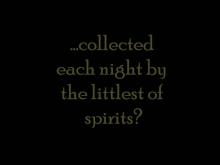 Gossamer
Gossamer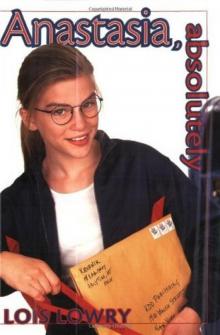 Anastasia, Absolutely
Anastasia, Absolutely Gooney Bird Is So Absurd
Gooney Bird Is So Absurd Anastasia at Your Service
Anastasia at Your Service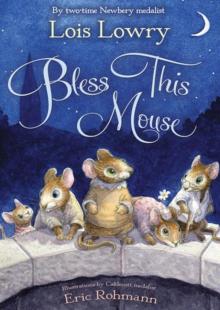 Bless this Mouse
Bless this Mouse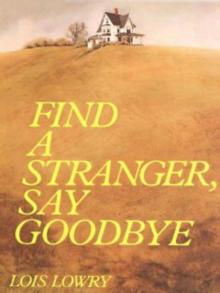 Find a Stranger, Say Goodbye
Find a Stranger, Say Goodbye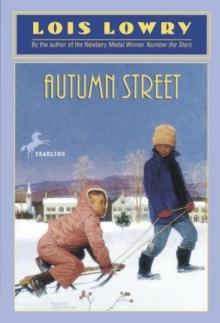 Autumn Street
Autumn Street Stay Keepers Story
Stay Keepers Story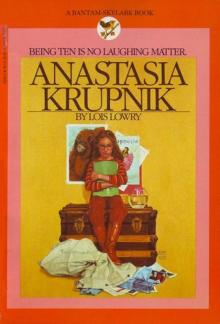 Anastasia Krupnik
Anastasia Krupnik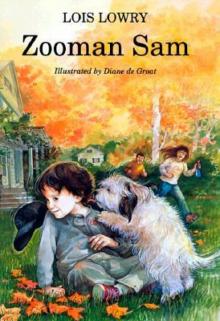 Zooman Sam
Zooman Sam On the Horizon
On the Horizon Anastasia, Ask Your Analyst
Anastasia, Ask Your Analyst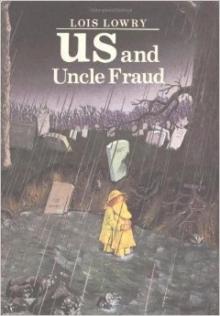 Us and Uncle Fraud
Us and Uncle Fraud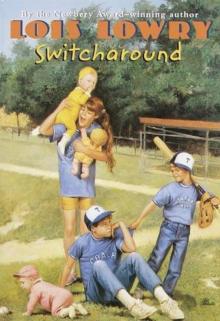 Switcharound
Switcharound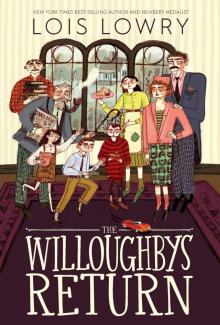 The Willoughbys Return
The Willoughbys Return Dear America: Like the Willow Tree
Dear America: Like the Willow Tree Shining On
Shining On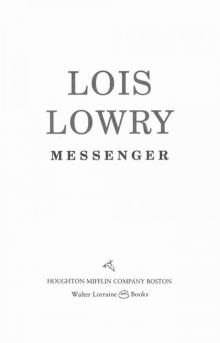 Messenger (The Giver Trilogy)
Messenger (The Giver Trilogy)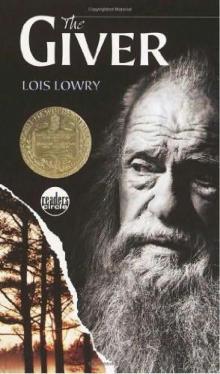 Giver Trilogy 01 - The Giver
Giver Trilogy 01 - The Giver